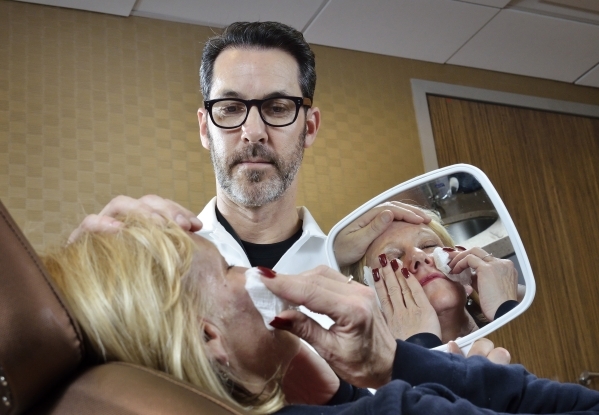Body modification obsessions can have health effects
Like Hollywood, the Las Vegas entertainment industry places a strong emphasis on physical appearance.
From pool parties to nightclubs, tourists and residents alike can feel pressured to look a certain way.
"Las Vegas has placed value on appearance," said plastic surgeon Dr. Samir Pancholi. "Studies have shown that better-looking people are favored, so individuals are willing to do anything that gives them an edge over the next person. It can become addictive in that process."
Specifically, addictive body alterations can stem from cosmetic surgery and tanning.
Cosmetic surgery
While cosmetic surgery and plastic surgery deal with improving a patient's body, the goals of the two are different.
Plastic surgery focuses on repairing a defect to reconstruct a normal function and appearance, whereas cosmetic surgery primarily focuses on enhancing the appearance of an individual.
"Typically people who become addicted to cosmetic surgery deal with body dysmorphic (disorder)," Pancholi said. "When these individuals look at their body, they don't see what everyone else sees because their perception of their body image is morphed."
To Pancholi, the number of surgeries an individual undergoes is not enough to label them as an addict. Those who are hooked generally become obsessed with one type of surgery.
"After a woman has a child, she may come in for a tummy tuck, some liposuction and a breast augmentation, but does that mean that she's addicted because she had more than one surgery?" he said. "Someone who is obsessed might have had a breast augmentation, and now they want to go bigger. Then they come in later to get them even bigger, and then later to get them reshaped. They go through seven or eight breast surgeries, and they still want more."
Serving as the medical director of Cosmetic Surgery of Las Vegas and president of the American Board of Cosmetic Surgery, Pancholi has been practicing cosmetic surgery in Las Vegas for nine years.
Throughout his work, he said he's declined to operate on patients with body dysmorphic disorder and referred them to counseling instead; however, the downside in saying "No" is that they can always find another doctor willing to perform the surgery.
"You have to be careful in engaging these types of people because it brings on something that you will never be able to fix," he said. "When someone has an appearance that is appropriate, and they have significant problems with it, you're likely not going to change what they see. You have to play their mind game of what they want to fix, but if it's not what they had in mind, then you've lost."
Pancholi said it's important for doctors to spend time getting to know their patients so they can pinpoint their needs and detect underlying issues.
"If they say things like, 'My face is not pretty enough,' or, 'I don't like my nose,' then these are things that can tip a surgeon off that there may be something wrong," he said. "Not only is it important for patients to choose the right doctor, but doctors need to seek the right patients.
"At the end of the day, we have to make sure that the person is in a better spot. If they're in emotional distress, they shouldn't even make it to the operating room."
Tanning
While some might tan their skin to enhance their appearance, studies indicate sunlight releases endorphins in the brain that can cause individuals to become physically addicted to tanning, according to dermatologist Dr. Misty Caudell.
"There's a 2006 human study that looked at people who were frequent tanners, who tanned eight to 15 times a month, and people who are infrequent tanners, who tanned less than 12 times per year," she said. "They gave them an endorphin blocker, and the people who were frequent tanners went through withdrawal-like symptoms, such as jitteriness and nausea. Two participants actually withdrew from the study because of the symptoms."
Excessive tanning or sun exposure can lead to premature aging of the skin, early cataracts and skin cancer. Melanoma is the worst type of skin cancer and can spread and become fatal if left untreated.
"Individuals who use tanning salons are half to 2½ times more likely to develop non-melanoma skin cancers," Caudell said, "but the first exposure to a tanning bed increases the risk of developing melanoma by 75 percent."
Caudell, who has been practicing since 2009, recommends individuals wear protective clothing and sunscreen if they plan to spend more than 20 minutes in the sun. She also suggests people get spray tans as a healthier alternative.
"In my personal experience, it's not that common to see tanning addictions, but I have had patients continue to tan despite developing skin cancer," Caudell said. "It's similar to someone who is addicted to smoking; they know there's the risk of lung cancer and other health issues, yet they continue to smoke."
Visit drpancholi.com or thomasderm.com.
Addiction Series
View plans to spend the next several months exploring the topic of addictions in Sin City in a bi-monthly series that will cover everything from alcohol and food to technology and shopping. Watch for the next Addiction Series story in the Aug. 20 issue, with a part-one look at technology addiction.

















